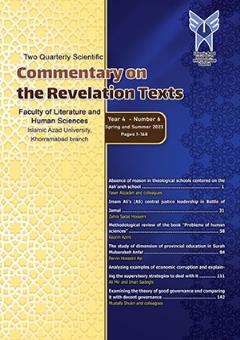Examining the theory of good governance and comparing it with decent governance from the perspective of Imam Ali (AS)
Subject Areas : Thematic interpretation of Nahj al-Balagha
Mostafa Shokri
1
*
![]() ,
Fateme Tahmasbifar
2
,
Fatemeh Rahmani
3
,
Fateme Tahmasbifar
2
,
Fatemeh Rahmani
3
1 - PhD in Economics, Tabriz University, Tabriz, Iran
2 - Master of Educational Management, Khorramabad Branch, Islamic Azad University, Khorramabad, Iran
3 - Master of Entrepreneurship, Babol Center, Payam Noor University, Babol, Iran
Keywords: Management, Good governance, Nahj Al-Balagha, decent governance, governance indicators,
Abstract :
The main purpose of this article is to examine the theory of good governance and compare it with decent governance from the perspective of Imam Ali (AS). During the last few decades, good governance or optimal governance has been highly noticed by social science researchers, although good governance has continuously occupied the thoughts of rulers and statesmen. This is despite the fact that good governance and its importance in Islam is not a new phenomenon and the importance of good governance has been mentioned many times in Islamic sources; In this article, using the descriptive-argumentative method, firstly, good governance and its indicators are defined and explained with a western approach, then decent governance and its indicators are introduced from the perspective of Hazrat Ali (AS) in the valuable book Nahj-ul-Balagha. . Finally, two approaches of good governance and competent governance have been compared and concluded. The results of this study show that Imam Ali's view on governance is more complete and comprehensive than the concept of good governance in many cases.
دشتی، محمد (١٣٩٠)؛ نهج البلاغه؛ قم: مؤسسه فرهنگی تحقیقی امیرالمومنین، چاپ دوازدهم.
سروش محلاتی، محمد (1380)؛ اهداف و آرمان های حکومت، قبسات، شماره 20 و21.
صالحی، مطهره (1402)؛ بررسی و تبیین شاخص¬های تحقق حکمرانی خوب در راستای توسعه یافتگی، فصلنامه جغرافیا و روابط انسانی،6 (1): 331-318.
لطفی، بهروز؛ خرازی¬محمدوند، زهرا؛ مظفری، افسانه (1402)؛ استقرار حکمرانی خوب در دستگاه-های دولتی جمهوری اسلامی ایران با بهره¬مندی از ارتباطات استراتژیک، فصلنامه رهیافت¬های نوین در مدیریت جهادی و حکمرانی اسلامی، 3(2): 152-126.
لنکرانی، محمدفاضل (1373)؛ آیین کشورداری از نگاه امام علی(ع)، تهران: دفتر نشر فرهنگ اسلامی.
مرشدی¬زاده، علی (1396)؛ حکمرانی خوب و حکمرانی مطلوب در تمدن نوین اسلامی، دوفصلنامه آینده پژوهی ایران، 2(2):140-125.
مصباح یزدى، محمدتقی (1382)؛ کاوشها و چالشها، نگارش محمدمهدى نادرى و سید ابراهیم حسینى، قم: مؤسسه آموزشى و پژوهشى امام خمینى(رحمه الله).
معمارزاده، غلامرضا؛ جاسبی، جواد؛ نفری، ندا (1389)؛ حکمرانی خوب: اکولوژی متعادل، فصلنامه پژوهش¬های ارتباطی، 21(1): 45-21.
مفتح، محمدهادی؛ قاسمی، غلامعلی؛ کردنژاد، نسرین (1394)؛ امکان¬سنجی اجرای نظریه حکمرانی خوب در جوامع اسلامی با تاکید بر جمهوری اسلامی ایران، فصلنامه پژوهشی حقوق اسلام و غرب، 2(2): 179-152.
ناظمی اردکانی، محمد (1391)؛ حکمرانی خوب بارویکرد اسلامی، راهبرد توسعه، سال هشتم، شماره 3.
هداوند، مهدی (1384)؛ حکمرانی خوب، توسعه و حقوق بشر، نشریه حقوق اساسی2(4)، 86-51.
The World Bank website in 1999 at: https://www.worldbank.org/en/home Kaufmann, Daniel (2003), Rethinking Governance: Empirical Lessons Challenge Orthodoxy (March 11, 2003). Available at SSRN: https://ssrn.com/abstract=386904 or http://dx.doi.org/10.2139/ssrn.386904.
Nikzad ,Rashid (2021),Governance, Institutions, and Economic Development ,International Journal of Innovation and Economic Development, Volume 7, Issue 4, Pages 7-22.

